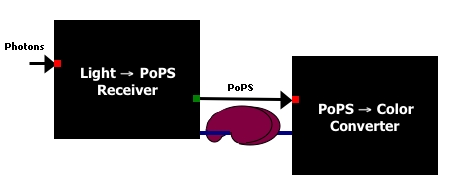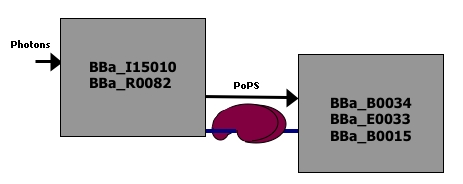Difference between revisions of "Featured Parts:Light Sensor"
| Line 3: | Line 3: | ||
From Levskyaya ''et al.'' | From Levskyaya ''et al.'' | ||
| − | '''We have designed a bacterial system that is switched between different states by red light. The system consists of a synthetic sensor kinase that allows a lawn of bacteria to function as a biological film, such that the projection of a pattern of light on to the bacteria produces a high-definition (about 100 megapixels per square inch), two-dimensional chemical image.''' | + | {| |
| + | | width=25px | | ||
| + | |'''"We have designed a bacterial system that is switched between different states by red light. The system consists of a synthetic sensor kinase that allows a lawn of bacteria to function as a biological film, such that the projection of a pattern of light on to the bacteria produces a high-definition (about 100 megapixels per square inch), two-dimensional chemical image."''' | ||
| + | |} | ||
===Sample photos=== | ===Sample photos=== | ||
| Line 33: | Line 36: | ||
[[Image:Coliroidparts.jpg]]<br> | [[Image:Coliroidparts.jpg]]<br> | ||
Diagram courtesy of [http://openwetware.org/wiki/Drew_Endy Drew Endy]. | Diagram courtesy of [http://openwetware.org/wiki/Drew_Endy Drew Endy]. | ||
| + | |||
| + | For details on system implementation, see the reference at the bottom of this page. | ||
===BioBricks parts list=== | ===BioBricks parts list=== | ||
| Line 57: | Line 62: | ||
===Other=== | ===Other=== | ||
| − | + | #[http://openwetware.org/wiki/BE.109:Systems_engineering MIT Biological Engineering laboratory module] on bacterial photography developed by [http://openwetware.org/wiki/Natalie_Kuldell Natalie Kuldell] | |
| − | + | #[http://openwetware.org/wiki/LightCannon Instructions] for how to build a "light cannon" for use in bacterial photography. | |
Revision as of 21:20, 4 May 2006
Contents
System overview
From Levskyaya et al.
| "We have designed a bacterial system that is switched between different states by red light. The system consists of a synthetic sensor kinase that allows a lawn of bacteria to function as a biological film, such that the projection of a pattern of light on to the bacteria produces a high-definition (about 100 megapixels per square inch), two-dimensional chemical image." |
Sample photos
Here are a selection of sample coliroid taken with the bacterial photography system.
| http://openwetware.org/images/9/9a/Macintosh_HD-Users-nkuldell-Desktop-bacterialselfportrait.jpg | http://openwetware.org/images/8/83/UT_HelloWorld.jpg | http://openwetware.org/images/thumb/d/d1/ColiroidEllington.png/200px-ColiroidEllington.png | http://openwetware.org/images/6/68/ColiroidFSM.jpg |
| [http://openwetware.org/wiki/Jeff_Tabor Jeff Tabor] holding a coliroid. Photo credit: Marsha Miller, University of Texas at Austin. Image courtesy of UT/UCSF. |
Hello World coliroid published in Levskaya et al., Nature, 2005. | This is a coliroid portait of Andy Ellington. You can compare it with the [http://www.icmb.utexas.edu/images/faculty/ellington.jpg real Andy]. Image courtesy of UT/UCSF. | This is a coliroid of the [http://venganza.org Flying Spaghetti Monster]. Image courtesy of UT/UCSF. |
Device implementation
This system consists of two devices.
- A light sensor which takes red light as an input and produces PoPS as an output.
- A color generator which takes a PoPS signal as input and generate color as an output.

Diagram courtesy of [http://openwetware.org/wiki/Drew_Endy Drew Endy].
Parts implementation
This diagram shows the list of parts that make up each of the two devices.

Diagram courtesy of [http://openwetware.org/wiki/Drew_Endy Drew Endy].
For details on system implementation, see the reference at the bottom of this page.
BioBricks parts list
Light sensing parts
Color generating parts
Related parts
Contact
- System design and implementation by [http://openwetware.org/wiki/User:Levskaya Anselm Levskaya], Aaron Chevalier, [http://openwetware.org/wiki/Jeff_Tabor Jeff Tabor], [http://openwetware.org/wiki/User:LLavery Laura Lavery], Matthew Levy, Eric Davidson, Alexander Scouras, [http://ellingtonlab.org/ Andy Ellington], Ed Marcotte, and [http://www.voigtlab.ucsf.edu/ Chris Voigt].
References
Papers
- Engineering Escherichia coli to see light
Nature 24 November 2005 DOI:10.1038/nature04405
A. Levskaya et al.
[http://www.nature.com/nature/journal/v438/n7067/full/nature04405.html URL] [http://www.ncbi.nlm.nih.gov/entrez/query.fcgi?cmd=Retrieve&db=pubmed&dopt=Abstract&list_uids=16306980 Pubmed] [http://www.hubmed.org/display.cgi?uids=16306980 Hubmed]
Other
- [http://openwetware.org/wiki/BE.109:Systems_engineering MIT Biological Engineering laboratory module] on bacterial photography developed by [http://openwetware.org/wiki/Natalie_Kuldell Natalie Kuldell]
- [http://openwetware.org/wiki/LightCannon Instructions] for how to build a "light cannon" for use in bacterial photography.
